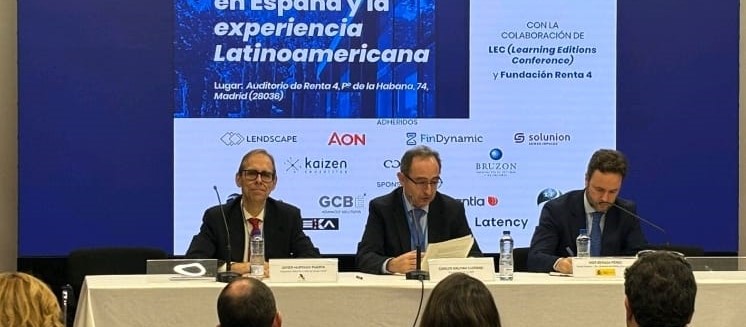On November the 20th, the I Inter-Assembly Congress of the Spanish Factoring Association was held in Madrid. It counted with the collaboration of Learning Editions Conference y Renta 4 Foundation. The central theme of the event, which was sponsored by Alvantia, was electronic invoicing in Spain and the Latin American experience.
After the presentation of the event, made by the president of the AEF, Carlos Dalmau, the first panel was held. Victor Ausín Rodríguez, General Director of Economic Policy of the Ministry of Economy, Trade and Industry, and Javier Hurtado Puerta, Deputy Inspector to the Head of the ONIF Area of the Ministry of Finance, analyzed the role of electronic invoicing from the legislator’s perspective. Special emphasis was placed on Verifactu, the system for issuing verifiable invoices in Spain, whose main objectives are:
-To normalize and standardize computerized billing records
-To ensure the inalterability of billing records once produced
-To expand tax assistance services
Adrian Burgos, president of the AEF’s Electronic Invoicing Commission, moderated the following panel, in which experts Javier Fernandez Caldito, Head of Corporate Business Development at BBVA, Nieves Gonzalez Ferreiro, head of BNP Paribas Factor Spain, Javier Molinero Sánchez, head of BFF Bank Spain and Loïs Duhourcau, CEO of Novicap Spain, talked about the influence of electronic invoicing in the factoring sector. Electronic invoicing enables the configuration of processes for the assignment and financing of trade receivables with high levels of transparency and operational security for all parties involved, especially for the financier, which directly boosts access to credit for companies.
Finally, during the afternoon session, several experts from the Factoring sector in Latin America shared, in a panel moderated by Sergio Manriquez, the main milestones of electronic invoicing in the region. Emilio Payera, Legal and Tax Manager of Coval Servicios Financieros; Alexander Best, Factoring and Leasing Manager of Banco Estado; Juliana Carmona, president of ASOFACE and Víctor Valdez, partner of Rebaza Alcázar & de las Casas, analyzed the regulations and the electronic invoicing process in Chile, Colombia and Peru, respectively.
These countries are a benchmark in the world of electronic invoicing: Chile was the pioneer in establishing it (20 years ago the Internal Revenue Service defined the format and standards of the system) and Colombia and Peru adapted its model to their respective geographies, entering into a process of massification of electronic invoicing. Thanks to this process, many companies in the financial sector have made positive changes in the way they process the hundreds or thousands of invoices they receive every year.
All the experts agreed that the advantages of electronic invoicing are clear: the assignment process is streamlined and simplified, the risk of double transmission of the credit is eliminated, the enforceability of the invoice is conformed, the seller notifies and communicates the assignment to the debtor in the system itself, … Everything is done in a transparent manner for the parties involved and for the tax authority. In short, there is a gain in operational security, agility and costs, which boosts the trade credit financing market and helps small and medium-sized companies to have access to greater and cheaper liquidity.


